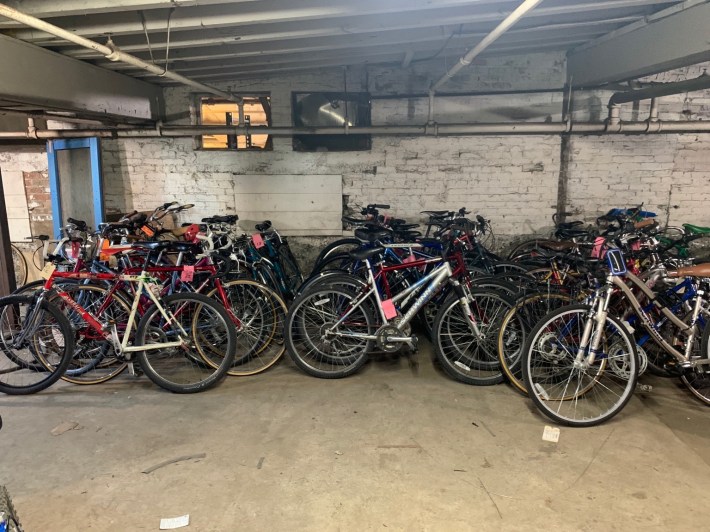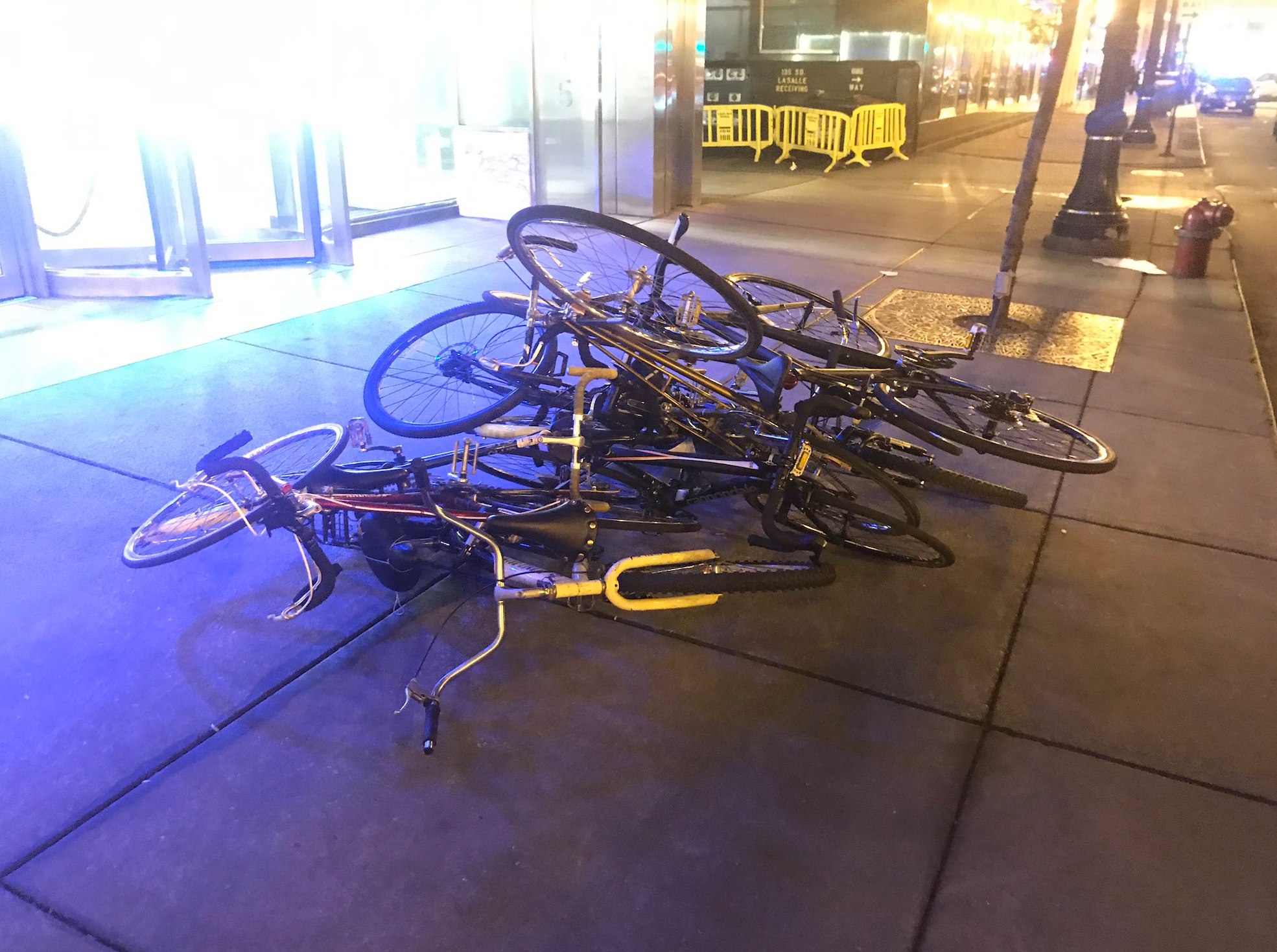Update 8/26/20, 2:30 PM: The 35th ward office hosted the first round of bike pickups this past Sunday and 26 out of the 39 bikes received from the July 17 protest were picked up by their owners or an owner's representative, according to volunteers with Safe Bike Chicago. One person decided to donate their bike to the group, and one wheel and three tubes were also donated to fix other bikes.
The ward office will hold a second pickup event this Sunday from 12 to 5 p.m. for the 13 remaining bikes to get back home. Alderman Carlos Ramirez-Rosa and his staff said they still working with the Chicago National Lawyer's Guild to recover more of the bikes confiscated by the Chicago Police Department during the Columbus statue protest and the Loop protest.
Altercation between police and protesters on Michigan and Wacker pic.twitter.com/CznXvUTC9W
— Madeline Kenney (@madkenney) August 15, 2020
A spokesperson for the Chicago Police Department told Streetsblog 17 bikes were taken over the weekend and inventoried and that owners could retrieve them, but declined to comment on the specific actions taken against people with bikes. The spokesperson said that since Tuesday only one person had retrieved their bike.
There was a similar scene at the July 17 Columbus statue protest when cops nabbed at least 75 bikes. In response to these confiscations, a new grassroots group called Safe Bike Chicago is stepping up to help protesters who lost their wheels, prioritizing those who use cycling as their main form of transportation.
Marcus, an independent marshal at the protest who has actively facilitated safety at protests, said the bike he used last weekend, which was a loaner from his mechanic, was taken by police as he was backing away from them. He described the downtown scene as traumatic and was shocked at how quickly things escalated. After fights broke out and pepper spray was used on the crowd, police boxed in protesters, a controversial tactic called “kettling” that has raised concerns from organizers and aldermen.
“I was pushed four blocks down the street by police and [then] standing in a sea of 300 officers," Marcus said. "Am I going to retrieve that bike? There’s no way." He reported seeing at least 50 people separated from their cycles during the protest and social media posts showed piles of bikes that were then taken by police, classified as "abandoned property."
Marcus is also a volunteer with Safe Bike Chicago and has been helping the group fix damaged bikes, catalog bike requests from protesters after theirs were taken, and work with individuals to help them get back on the saddle as fast as possible.
Another Safe Bike volunteer named Chicle said the group has seen an outpouring of community support to help protesters who've lost bikes to the CPD. The group raised $80,000 in three days after the Columbus protest and received 103 requests for bikes. Another 31 requests came in after this past weekend. Safe Bike has also received donated bikes, and hosted its first official bike donation event last Sunday at Working Bikes, accepting 42 bikes that will go to protesters whose cycles got stolen, who need them for daily transportation. “It was double what we were hoping for,” Chicle said. “We were hoping for 20; we were expecting 10. We really didn’t know, our expectations were low, but it was amazing.”
He added it was gratifying to see the many donations come in, as well and as the protesters who picked up bikes. One young woman, who was arrested the night before at the protest and had her bike confiscated, came in right after getting released from jail because she needed a way to get home. “It was unbelievable," Chicle said. "She had just gotten maced, spent the night in jail, and had to come all the way over here just to pick up a bike,” he said.
Prior to the event, Safe Bike gave cycles to 15 people from the Columbus protest with donated bikes, and the 42 bikes received Sunday will grow that number. Funds raised will go towards getting new bikes for protesters and marshals, as well as giving out stipends for bike repairs or day-to-day needs. Chicle said the monetary gifts, which could be a couple hundred dollars, are the group’s way of showing kindness and gratitude to those on the front lines.

A college student who requested anonymity was at Saturday's protest and was one of the 31 new requests on the Safe Bike list. During the demonstration she used her cycle as a barricade and had it taken after she was pepper-sprayed by police twice. She said doesn’t feel comfortable going to pick it up from the police because she doesn’t want to give the CPD personal information that she fears could be used against her.
“I am trying to figure out how to get a bike again because that’s my main mode of transportation,” she said. “I rely on my bike to get to both of my jobs.”
Safe Bike organizers say their goal is to get all the bikes back to their owners. The group is working with the Chicago National Lawyers Guild to recover the confiscated bikes, and on Wednesday a deal was struck between the NLG, CPD and 35th Ward alderman Carlos Ramirez-Rosa, who said it was wrong of the police to seize the bikes, and that he wanted to use his power to help people reunite with their wheels.
Ramirez-Rosa, who has bike marshaled in the past and said he knows the value of bike barricades for protest safety, told Streetsblog he and the NLG were able to recover 39 out of the about 75 bikes taken from the July 17 protest and his office will host a pick-up event this Sunday from 12 to 5 p.m. at his ward office at 2934 N. Milwaukee Ave., Unit C. He said the city is requiring stringent proof of ownership for each bike, so he expects it will take time for the rest to be available for pick-up. However, he added he remains committed to working with CPD and NLG to help get the bikes back to their owners, especially during the pandemic.
“It was even more important to get involved because so many people depend on their bikes for their livelihood and main form of transportation, particularly in this pandemic when people might not want to share a car or take public transportation, especially as it’s increasingly difficult to find a bike,” Ramirez-Rosa said.
As the need for community support grows in response to protest about police brutality and defunding CPD, possible mass evictions, immigrant deportation, and other critical social justice issues, Chicle said Safe Bike’s work is necessary and will keep growing. The group is working on longer-term plans to train, equip, and organize bike marshals and might hold more donation events.
“There is going to continue to be more of a need for folks who can respond to these actions and try to be there support folks who could be kicked out of their houses or are just trying to have a peaceful march,” Chicle said.
Safe Bike Chicago needs volunteer mechanics to help them continue fixing up bikes, especially as bike shops remain busy due to higher ridership during the pandemic. The organization also plans to start accepting monetary donations again and is still taking bike donations and requests. Email info@safebikechicago.org for more info.




